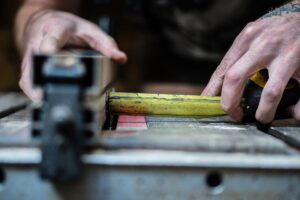Writer: Liz Palmer
 2 min read February 2022 — As a result of the national labor shortage, many Cincinnati manufacturers have struggled to keep up with consumer demand. To meet the challenge, some business leaders have gotten creative in recruitment and retention, looking toward those who historically have been refused the opportunity to prove themselves: the formerly incarcerated and those who struggle with addiction.
2 min read February 2022 — As a result of the national labor shortage, many Cincinnati manufacturers have struggled to keep up with consumer demand. To meet the challenge, some business leaders have gotten creative in recruitment and retention, looking toward those who historically have been refused the opportunity to prove themselves: the formerly incarcerated and those who struggle with addiction.
Cincinnatian manufacturers also see the hiring practice, called “Fair chance,” as a way to help members of their community get back on their feet while stimulating the local economy and production.
The Bureau of Labor Statistics reported Cincinnati’s unemployment rate at 13.6% in April 2020 dropping to 2.8% by the end of 2021. On paper, unemployment numbers are steadily recovering. What these numbers don’t show are those who aren’t looking for work, such as those who are retiring or leaving the workforce to become caregivers at home. The Great Resignation still plagues Greater Cincinnati, even as unemployment numbers continue to fall.
An article in the Cincinnati Business Courier provides key examples of the region’s construction sector fighting to secure enough employees to meet the community’s needs. Younger generations have pivoted toward college and away from blue-collar work, and baby boomers are at retirement age. The mass exodus of one generation from the industry without the succession of a younger one has had devastating effects on a sector that is struggling to meet demand.
The crisis has laid the foundation for innovative solutions. Local businesses are finding nontraditional ways to keep doors open. Fair chance hiring practices are an example. JBM Packaging CEO and President Marcus Sheanshang is one leader looking to fair chance initiatives to help supply skilled workers. In a local news column, Sheanshang shared the mindset shift he needed to “identify a labor source beyond traditional job postings if we wanted to grow and remain competitive” by looking toward individuals recently released from local correctional facilities.
“We had a problem, as many companies do out there, of finding enough team members,” Sheanshang said in an interview with another local newspaper. In a labor market where retention of skilled talent is almost as difficult as finding it in the first place, Sheanshang reported the retention of fair chance workers being 11% more than other employees.
The collaboration with correctional facilities to match formerly incarcerated individuals with employment opportunities results in JBM Packaging directly addressing reentry programming for community members, stimulating the local economy and having enough skilled labor to keep production alive despite a labor shortage.
The Manufacturing Institute encourages second-chance employment endeavors and looks to Nehemiah Manufacturing Co., another Cincinnatian company that has been successfully hiring and retaining formerly incarcerated Ohioans for over a decade. If the manufacturing industry is leading the conversation on fair chance employment, Cincinnati is leading by example.
